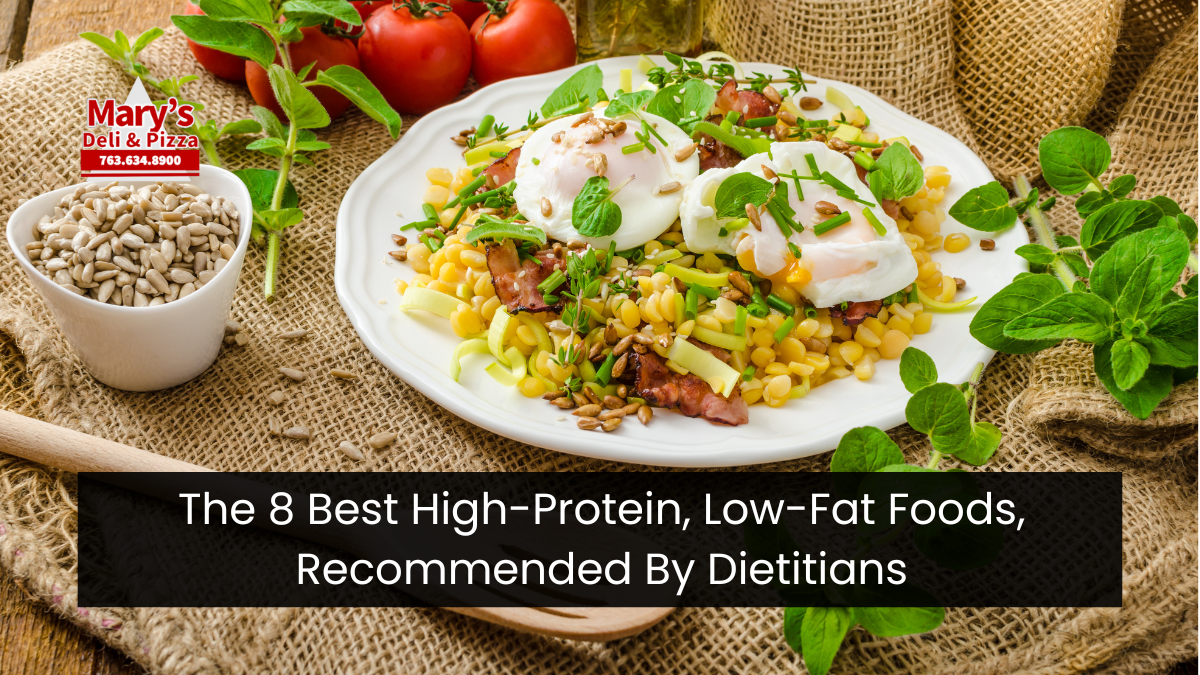If you’re aiming to build muscle, lose fat, or maintain a balanced diet, high-protein, low-fat foods are key. These foods not only help repair muscles and support growth but also keep you feeling fuller for longer.
Dietitians consistently recommend these options for those who want to achieve their health goals without loading up on unnecessary fats. Let’s dive into the eight best high-protein, low-fat foods to include in your diet.
1. Chicken Breast
Chicken breast is one of the most popular sources of lean protein. A 3-ounce serving of skinless chicken breast provides about 27 grams of protein and less than 3 grams of fat, making it ideal for muscle-building diets.
| Nutrient | Per 3-ounce serving |
|---|---|
| Protein | 27 grams |
| Fat | Less than 3 grams |
Why Dietitians Love It: It’s versatile, low in calories, and packed with protein, which aids in muscle repair and satiety.
2. Egg Whites
Egg whites are virtually fat-free and rich in protein. One egg white contains about 3.6 grams of protein and minimal fat. They’re perfect for omelets, scrambles, or baking.
| Nutrient | Per 1 egg white |
|---|---|
| Protein | 3.6 grams |
| Fat | 0 grams |
Why Dietitians Love It: Egg whites offer pure protein, making them a low-calorie and heart-healthy choice.
3. Greek Yogurt
Non-fat Greek yogurt is another excellent high-protein, low-fat option. A 6-ounce serving provides about 15 grams of protein and zero fat.
| Nutrient | Per 6-ounce serving |
|---|---|
| Protein | 15 grams |
| Fat | 0 grams |
Why Dietitians Love It: Greek yogurt is rich in probiotics, which promote gut health while delivering protein and calcium.
4. Cottage Cheese (Low-Fat Or Fat-Free)
Cottage cheese is rich in casein, a slow-digesting protein. A half-cup of low-fat or fat-free cottage cheese has around 14 grams of protein and less than 2 grams of fat.
| Nutrient | Per 1/2 cup |
|---|---|
| Protein | 14 grams |
| Fat | Less than 2 grams |
Why Dietitians Love It: Cottage cheese makes a filling snack or meal addition and is rich in calcium for bone health.
5. Tuna (Canned In Water)
Canned tuna is a convenient, affordable high-protein, low-fat food. A 3-ounce serving provides 20 grams of protein and less than 1 gram of fat.
| Nutrient | Per 3-ounce serving |
|---|---|
| Protein | 20 grams |
| Fat | Less than 1 gram |
Why Dietitians Love It: Tuna is versatile for salads, sandwiches, or wraps, offering lean protein with heart-healthy omega-3s.
6. Lentils
Lentils are a plant-based protein powerhouse. A 1/2-cup serving of cooked lentils provides around 9 grams of protein and less than 0.5 grams of fat.
| Nutrient | Per 1/2 cup cooked |
|---|---|
| Protein | 9 grams |
| Fat | Less than 0.5 grams |
Why Dietitians Love It: Lentils are fiber-rich, aiding digestion while offering a solid dose of plant-based protein.
7. Turkey Breast
Much like chicken, turkey breast is lean and packed with protein. A 3-ounce serving of skinless turkey breast contains about 25 grams of protein and less than 2 grams of fat.
| Nutrient | Per 3-ounce serving |
|---|---|
| Protein | 25 grams |
| Fat | Less than 2 grams |
Why Dietitians Love It: It’s great for a post-workout meal or a lean protein option at lunch, providing muscle-building nutrients without excess fat.
8. Tofu
Tofu is a plant-based protein derived from soybeans. A 3-ounce serving of firm tofu provides around 8 grams of protein and only 2 grams of fat.
| Nutrient | Per 3-ounce serving |
|---|---|
| Protein | 8 grams |
| Fat | 2 grams |
Why Dietitians Love It: Tofu is versatile, absorbing flavors well and fitting easily into various cuisines. It’s also a great alternative for those avoiding animal products.
Conclusion:
Incorporating high-protein, low-fat foods into your diet can provide multiple health benefits, from muscle recovery to improved satiety and weight management. These eight options, recommended by dietitians, offer both convenience and nutritional value, making them essential staples for a balanced diet.
Whether you’re into plant-based proteins or prefer animal-based sources, there’s a high-protein, low-fat food for everyone.
FAQs
1. What Is The Best High-Protein, Low-Fat Food For Vegans?
Lentils and tofu are excellent choices for vegans as they provide substantial amounts of plant-based protein with minimal fat.
2. How Much Protein Should I Consume Daily?
For most adults, the recommended daily intake is around 46 grams for women and 56 grams for men, but it varies based on activity level and health goals.
3. Are High-Protein, Low-Fat Foods Good For Weight Loss?
Yes, these foods help maintain muscle mass, promote fat loss, and keep you full longer, making them ideal for weight management.
4. Can I Eat Too Much Protein?
Yes, excessive protein intake without balancing other nutrients can lead to kidney strain and nutrient imbalances. Always aim for a balanced diet.
5. Is Greek Yogurt A Better Source Of Protein Than Regular Yogurt?
Yes, Greek yogurt contains more protein and less sugar compared to regular yogurt, making it a better option for high-protein diets.

